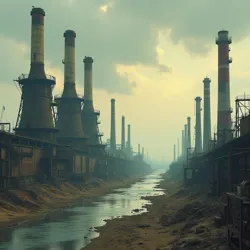INDUSTRIAL SOCIETY AND ITS FUTURE
 A desolate industrial landscape symbolizing the environmental and social costs of technological progress
A desolate industrial landscape symbolizing the environmental and social costs of technological progressThe "Industrial Society and Its Future" represents a critical analysis of modern technological civilization and its profound impacts on human society, psychology, and the natural world. This influential document examines the fundamental transformation of human life brought about by industrialization and technological advancement, arguing that these changes have produced severe negative consequences despite apparent material benefits.
Core Arguments
The text presents a comprehensive critique of industrial-technological society, highlighting how increased life expectancy and material comfort in developed nations have come at the cost of psychological well-being, social stability, and environmental integrity. The analysis suggests that technological progress, while superficially beneficial, has created a system that undermines human dignity and autonomy while causing widespread psychological suffering. This suffering extends to physical hardship in less developed regions, demonstrating the global reach of industrialization's negative effects.
The document explores the concept of technological dependency, arguing that modern humans have become increasingly reliant on complex systems they neither fully understand nor control. This dependency has led to what the text terms social atomization, where traditional community bonds and meaningful personal relationships have been replaced by superficial connections mediated through technology.
System Survival versus Collapse
A central theme of the analysis is the examination of two possible futures for the industrial-technological system. The first scenario envisions the system's survival and eventual evolution into a more stable form, but at the cost of fundamentally altering human nature and reducing living organisms to engineered components of a vast social machine. The document suggests that this outcome would result in a form of technological totalitarianism, where human autonomy and dignity are permanently sacrificed for system stability.
 Modern automated manufacturing facility representing the replacement of human labor with machines
Modern automated manufacturing facility representing the replacement of human labor with machinesThe alternative scenario involves the system's collapse, which the text acknowledges would cause significant suffering but might ultimately prevent worse long-term consequences. This analysis introduces the concept of systemic vulnerability, suggesting that the more complex and interconnected the technological system becomes, the more catastrophic its eventual breakdown could be.
Social and Psychological Impact
The document extensively examines the psychological effects of industrial society on individuals, introducing the concept of surrogate activities - pursuits that people engage in to fulfill the power process but which lack genuine meaning or purpose. This phenomenon is linked to widespread feelings of purposelessness, depression, and alienation in modern society.
The text also explores the relationship between technology and human freedom, arguing that technological progress inevitably restricts individual autonomy through various mechanisms of social control. This includes both obvious constraints and more subtle forms of manipulation through mass media and social engineering.
Environmental Consequences
A significant portion of the analysis is dedicated to examining the environmental impact of industrial society. The document introduces the concept of ecological overshoot, where technological advancement enables human society to temporarily exceed the natural carrying capacity of ecosystems, leading to long-term environmental degradation.
 A vulnerable natural ecosystem facing encroachment from industrial development
A vulnerable natural ecosystem facing encroachment from industrial developmentThe text argues that industrial society's relationship with nature is fundamentally unsustainable, creating a technological momentum that continues to accelerate environmental destruction despite growing awareness of ecological problems. This process is seen as self-reinforcing, as environmental degradation often leads to technological "solutions" that create new problems requiring further technological intervention.
Future Implications
The analysis presents a detailed examination of potential future developments in industrial society, introducing the concept of technological acceleration and its implications for human society. This includes discussion of how advancing technology might fundamentally alter human nature through genetic engineering, artificial intelligence, and other emerging technologies.
The document explores the concept of social complexity threshold, suggesting that human societies may be approaching or exceeding their ability to manage increasingly complex technological systems. This raises questions about the long-term viability of continued technological advancement and its implications for human civilization.
Proposed Solutions
While primarily focused on analysis rather than solutions, the document introduces several key concepts related to potential responses to the problems it identifies. These include the idea of technological regression, which suggests that some forms of technology might need to be abandoned to preserve human autonomy and environmental stability.
The text also explores the concept of sustainable technology, examining whether certain forms of technological development might be compatible with human dignity and environmental preservation. However, it ultimately expresses skepticism about the possibility of reforming the industrial-technological system while maintaining its current trajectory.
Legacy and Influence
The analysis has significantly influenced discussions about technology's role in society and has contributed to the development of various schools of thought, including neo-primitivism and anti-industrial environmentalism. Its arguments have become increasingly relevant as society grapples with issues such as artificial intelligence, automation, climate change, and social media's impact on human psychology.
The document's examination of the relationship between technology, society, and human well-being continues to inform debates about technological progress and its consequences. Its insights have contributed to fields such as environmental philosophy, technological ethics, and social impact assessment.
Academic Response
The academic community has engaged extensively with the ideas presented in this analysis, leading to the development of new theoretical frameworks for understanding technology's impact on society. This has included work in fields such as technological determinism and social ecology, as well as contributions to the broader field of technology criticism.
The document's arguments have also influenced research in psychology, sociology, and environmental science, particularly in understanding the relationships between technological progress, human well-being, and environmental sustainability. This has led to the development of new approaches to studying the social and psychological impacts of technological change.